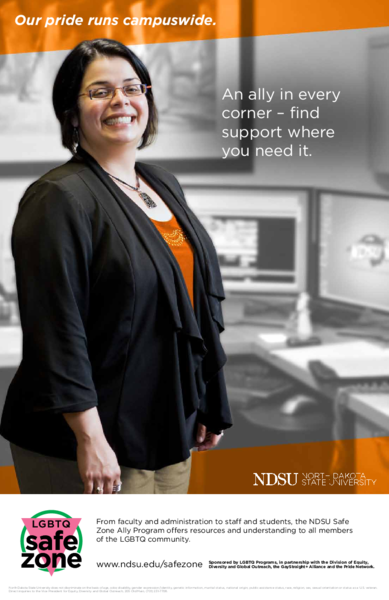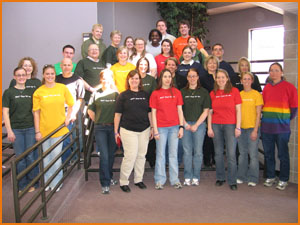What is an Ally?

Merriam-Webster's dictionary defines ally as:
1 : to unite or form a connection between : ASSOCIATE <allied himself with a wealthy family by marriage> 2 : to connect or form a relation between (as by likeness or compatibility)
An ally can also be thought of as a member of a majority group who works to end oppression -- in their personal and professional life -- through support of and as an advocate for an oppressed group.
Many people in our community and campus grew up with unexamined heterosexist attitudes, assumptions, and behaviors. It takes time to overcome attitudes and behaviors to which people have become acclimated to. We believe that becoming an ally of non-heterosexual people will help in moving from heterosexism to an alliance described below.
- Active Oppression
- Indifference
- Oppression through Lack of Action
- Confronting Oppression
- Growing as an Ally
- Challenging Oppression
- Joining an Ally Support Network
- Challenging Heterosexist Systems
What Can Allies Do?

There are a number of ways allies can show support for LGBTQ+ people:
- Pay attention to the words people use to describe themselves. Not everyone identifies as "gay" and "lesbian," and even fewer prefer "homosexual."
- Use non-gender-specific language. Ask, "Are you seeing someone?" or "Are you in a committed relationship?" instead of "Do you have a boyfriend/girlfriend?"
- Do not assume the sexual orientation of another person even when that person is married or in a committed relationship.
- And don't assume that someone who is transgender is gay or that the person will seek to transition in order to appear straight.
- Do not assume that a gay, lesbian, or bisexual person is attracted to you just because they have disclosed their sexual identity. If any interest is shown, be flattered, not flustered.
- Challenge your own conceptions about gender-appropriate roles and behaviors. Do not simply expect people to conform to society's beliefs about "women" and "men."
- Validate peoples' gender expressions. For example, if a male-born person identifies as a woman, refer to that person as "she" and use her chosen name.
- Speak out against statements and jokes that attack LGBTQ+ people. Letting others know that you find anti-LGBTQ+ statements and jokes offensive and unacceptable can go a long way towards reducing homophobia.
- Educate yourself about LGBTQ+ history, culture, and concerns.
- Support LGBTQ+ individuals because they add to the vibrancy of thought, activity, and life on campus.
- If you teach classes, include a statement in your course syllabus about creating a classroom environment that is welcoming and inclusive of all diverse identities. Setting ground rules such as these at the start of each semester can be very helpful if bigoted statements or action occur later in the semester.
- Be proud of your identity as an NDSU Safe Zone Ally. Display your stickers prominently in your office area. Consider adding a pdf image of the Safe Zone sticker - found here - to your course syllabus or departmental staff lists.


